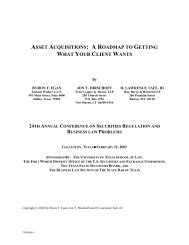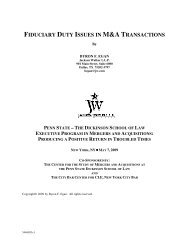Legal Implications of User Generated Content: YouTube, MySpace ...
Legal Implications of User Generated Content: YouTube, MySpace ...
Legal Implications of User Generated Content: YouTube, MySpace ...
You also want an ePaper? Increase the reach of your titles
YUMPU automatically turns print PDFs into web optimized ePapers that Google loves.
In July, a <strong>YouTube</strong> user sued Universal Music Publishing Group (“Universal”) formisrepresentation under this section. 39 The plaintiff, Stephanie Lenz, is apr<strong>of</strong>essional editor from Gallitzin, Pennsylvania. Earlier this year, Lenz posted avideo from <strong>YouTube</strong> that showed her child dancing to a slightly audible Prince songplaying in the background. Universal sent <strong>YouTube</strong> a takedown notice and thevideo was removed. Lenz then sent <strong>YouTube</strong> a counter-notice and the video wasultimately reposted to the website. Lenz sued Universal for misrepresentation under§ 512(f). Ms. Lenz claims that use <strong>of</strong> the music was obviously “fair use” andtherefore knowingly misrepresented that the posted content was infringing material.This case may give some guidance as to the meaning <strong>of</strong> “knowingly misrepresents.” 40F. Ownership IssuesDerivative WorksA derivative work is a work that is based on or derived from one or more preexistingworks. Copyright protection covers derivative works if those works include“an original work <strong>of</strong> authorship.” Some examples include: translations, musicalarrangements, and/or dramatizations. This copyright protection is limited, however.The protection only covers the aspects <strong>of</strong> the work that were changed.To create a derivative work, the derivative creator must have permission from theoriginal copyright owner. Therefore, UGC providers should incorporate thispermission into their terms and conditions.Joint OwnershipOftentimes, the UGC material is not the sole product <strong>of</strong> the person posting thecontent. A “joint work” is created when it is prepared by two or more authors withthe knowledge and intention at the time <strong>of</strong> creation that the contributions be mergedinto an “inseparable and independent parts <strong>of</strong> a unitary whole.” 41Joint works create their own unique rights. These include:1. The joint authors are treated as tenants in common.2. Each author has an independent right to use or nonexclusively license use <strong>of</strong>the work.3. The joint author can transfer his ownership to a third party but cannottransfer rights <strong>of</strong> any other joint owner.4. Must account to other joint authors for pr<strong>of</strong>its.39 Lenz v. Universal Music Publishing Group, C 07-03783-MEJ (N.D. Cal. complaint filed July 24, 2007).40 For another case alleging misrepresentation under section 512(f), see Kopp v. Vivendi Universal Games, No. 06-01767(C.D. Cal. complaint filed March 23, 2006).41 17 U.S.C. § 101.10
















